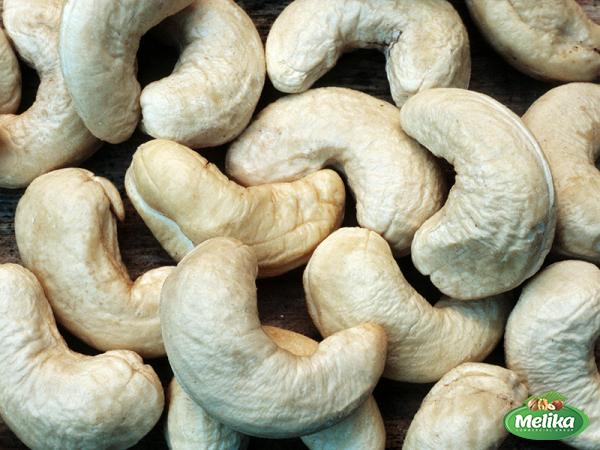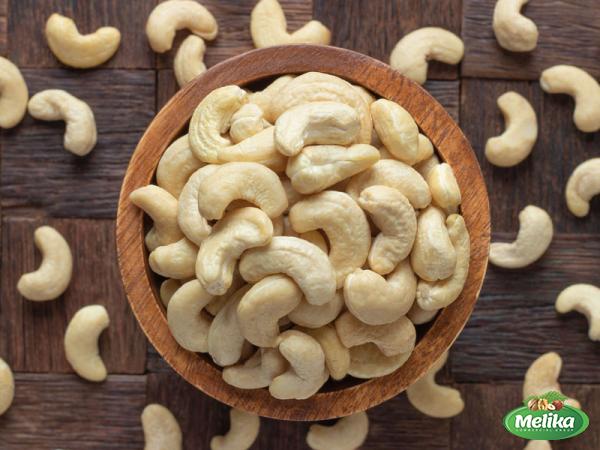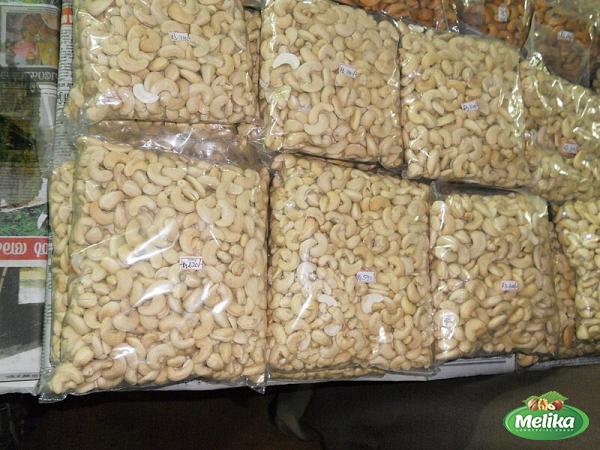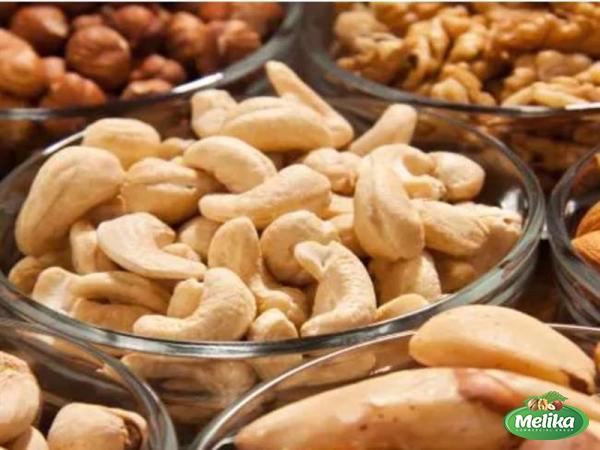Raw cashew nuts in shell (RCN) are the seeds of the cashew tree, scientifically known as Anacardium Occidentale. Native to Brazil, cashew trees are now predominantly cultivated in tropical regions such as Africa, Asia, and Latin America. RCN holds significant economic value due to its versatile applications in various industries including food and beverage, cosmetic, pharmaceutical, and agricultural sectors. This summary explores the characteristics, cultivation process, global market demand, challenges, and opportunities associated with raw cashew nuts in shell. Characteristics of Raw Cashew Nuts in Shell: Raw cashew nuts in shell possess several unique characteristics that make them highly sought after in global markets: 1. Nutritional Composition: RCN is a rich source of essential vitamins and minerals such as iron, vitamin E, magnesium, phosphorus, and zinc. It also contains beneficial fats and antioxidants that provide numerous health benefits. 2. Shell Residue: The cashew shell residue contains valuable substances like anacardic acids, cardol, and cardanol, which are utilized in the production of pharmaceutical drugs, biofuels, resins, and other industries. 3. Long Shelf Life: Properly stored raw cashew nuts in shell have a shelf life of up to one year, making them suitable for both domestic consumption and export. Cultivation Process and Major Producers: Cashew trees thrive in tropical climates and are cultivated in over 30 countries globally. The cultivation process involves: 1. Planting: Cashew trees are grown from seeds directly in the field or via grafting to accelerate growth. The tree takes 3-4 years to bear fruit. 2. Harvesting: Cashew trees produce cashew apples, which contain cashew nuts on their underside. Harvesting requires careful handling due to the toxic astringent liquid (urushiol) present in the fruit. 3. Processing: After harvesting, cashew nuts are separated from the cashew apples. The nuts are then dried, removing the remaining moisture, and the outer shell is removed. Top Cashew Nut Producers: The major cashew nut producers are: 1. Vietnam: Vietnam is the largest exporter of cashew nuts in the world. Its tropical climate and favorable cultivation conditions contribute to its high production levels. 2. India: India is the second-largest cashew nut producer, with a significant role in both the domestic and international markets. Indian cashew nuts are known for their quality and taste. 3. Ivory Coast: Ivory Coast is Africa’s largest cashew nut producer, with a focus on exporting raw cashew nuts. The country’s favorable climatic conditions make it an ideal location for cashew cultivation. Global Market Demand and Opportunities: The global demand for raw cashew nuts in shell has been steadily rising, driven by various factors: 1. Snack Industry: Cashew nuts are a popular choice for nutritious snacks and trail mixes. The growing health-conscious trend and the increasing popularity of plant-based diets have propelled demand in this sector. 2. Plant-Based Milk Alternatives: Cashew milk has gained popularity as a dairy-free milk alternative. Cashew nuts’ creamy texture and mild flavor make them an excellent choice for milk production. 3. Confectionery and Baked Goods: Cashews are widely used in the confectionery industry to create chocolates, desserts, and baked goods due to their rich flavor and texture. 4. Nutraceuticals and Pharmaceuticals: The nutraceutical and pharmaceutical industries utilize cashew nut extracts and by-products due to their potential health benefits, including antioxidant and anti-inflammatory properties. Opportunities and Challenges: While the global market for raw cashew nuts in shell presents several opportunities, there are also challenges that need to be addressed: Opportunities:

nuts
 1. Increasing Consumer Awareness: As consumers shift towards healthier snack options and sustainable alternatives, the demand for raw cashew nuts in shell is expected to grow. 2. Value Addition: Producing value-added products like cashew milk, roasted cashews, and cashew-based desserts can provide higher profit margins for manufacturers. 3. Emerging Markets: Expanding into new markets, particularly in developing countries with a rising middle class, presents lucrative opportunities for cashew nut producers and exporters. Challenges: 1. Price Volatility: The price of raw cashew nuts can be volatile due to various factors such as weather conditions, demand-supply dynamics, and geopolitical factors. 2. Processing Infrastructure: Developing and maintaining sufficient processing infrastructure and technology is crucial to meet quality standards and increase efficiency. 3. Quality Control: Ensuring consistent quality of cashew nuts throughout the supply chain, from cultivation to processing and packaging, is a challenge that needs to be address to maintain customer trust. Conclusion: Raw cashew nuts in shell offer a wide range of opportunities in the global market, driven by increasing consumer awareness and demand for healthy snacks, plant-based alternatives, and nutraceutical applications. However, challenges like price volatility, processing infrastructure, and quality control need to be addressed to maximize the potential of this lucrative business. Proactive measures, technological advancements, and sustainable cultivation practices can help cashew nut producers and exporters capitalize on this growing market demand.Raw Cashew Nuts in Shell: A Lucrative Opportunity in the Global Market I. Overview of the Raw Cashew Nut Market The market for raw cashew nuts in shell has experienced significant growth in recent years. The demand for cashew nuts has been driven by their nutritional value, versatile applications, and increasing consumer awareness of healthy snacking options. Global consumption of cashew nuts reached approximately 3.5 million metric tons in 2019, with further growth projected in the coming years. This presents a lucrative opportunity for cashew nut producers and exporters to capture a larger market share. II. Growing Demand for Healthy Snacks As consumers become more health-conscious, there has been a shift towards healthier snack options. Raw cashew nuts in shell fit this trend perfectly due to their high nutritional value. Cashew nuts are a good source of protein, healthy fats, vitamins, and minerals. They are also low in sugar and cholesterol. This makes them an attractive choice for health-conscious consumers looking for satisfying and nutritious snacks. III. Expansion of Plant-Based Diets The rise of plant-based diets has also contributed to the increasing demand for raw cashew nuts in shell. Many individuals are opting for dairy-free milk alternatives, and cashew milk has emerged as a popular choice. Cashew milk offers a creamy texture and a mild, slightly sweet flavor, making it a suitable substitute for traditional dairy milk. This trend has created opportunities for cashew nut producers to enter the plant-based milk market and cater to consumers seeking non-dairy alternatives. IV. Importance in the Confectionery Industry Cashew nuts play a vital role in the confectionery industry.
1. Increasing Consumer Awareness: As consumers shift towards healthier snack options and sustainable alternatives, the demand for raw cashew nuts in shell is expected to grow. 2. Value Addition: Producing value-added products like cashew milk, roasted cashews, and cashew-based desserts can provide higher profit margins for manufacturers. 3. Emerging Markets: Expanding into new markets, particularly in developing countries with a rising middle class, presents lucrative opportunities for cashew nut producers and exporters. Challenges: 1. Price Volatility: The price of raw cashew nuts can be volatile due to various factors such as weather conditions, demand-supply dynamics, and geopolitical factors. 2. Processing Infrastructure: Developing and maintaining sufficient processing infrastructure and technology is crucial to meet quality standards and increase efficiency. 3. Quality Control: Ensuring consistent quality of cashew nuts throughout the supply chain, from cultivation to processing and packaging, is a challenge that needs to be address to maintain customer trust. Conclusion: Raw cashew nuts in shell offer a wide range of opportunities in the global market, driven by increasing consumer awareness and demand for healthy snacks, plant-based alternatives, and nutraceutical applications. However, challenges like price volatility, processing infrastructure, and quality control need to be addressed to maximize the potential of this lucrative business. Proactive measures, technological advancements, and sustainable cultivation practices can help cashew nut producers and exporters capitalize on this growing market demand.Raw Cashew Nuts in Shell: A Lucrative Opportunity in the Global Market I. Overview of the Raw Cashew Nut Market The market for raw cashew nuts in shell has experienced significant growth in recent years. The demand for cashew nuts has been driven by their nutritional value, versatile applications, and increasing consumer awareness of healthy snacking options. Global consumption of cashew nuts reached approximately 3.5 million metric tons in 2019, with further growth projected in the coming years. This presents a lucrative opportunity for cashew nut producers and exporters to capture a larger market share. II. Growing Demand for Healthy Snacks As consumers become more health-conscious, there has been a shift towards healthier snack options. Raw cashew nuts in shell fit this trend perfectly due to their high nutritional value. Cashew nuts are a good source of protein, healthy fats, vitamins, and minerals. They are also low in sugar and cholesterol. This makes them an attractive choice for health-conscious consumers looking for satisfying and nutritious snacks. III. Expansion of Plant-Based Diets The rise of plant-based diets has also contributed to the increasing demand for raw cashew nuts in shell. Many individuals are opting for dairy-free milk alternatives, and cashew milk has emerged as a popular choice. Cashew milk offers a creamy texture and a mild, slightly sweet flavor, making it a suitable substitute for traditional dairy milk. This trend has created opportunities for cashew nut producers to enter the plant-based milk market and cater to consumers seeking non-dairy alternatives. IV. Importance in the Confectionery Industry Cashew nuts play a vital role in the confectionery industry.
Specifications of nuts
 Their rich flavor and creamy texture make them an ideal ingredient for chocolates, desserts, and baked goods. Cashew nuts can be used whole, chopped, or ground to enhance the taste and texture of confectionery products. The versatility of raw cashew nuts in shell allows confectionery manufacturers to create a wide range of innovative and indulgent treats, driving further demand for the product. V. Nutraceutical and Pharmaceutical Applications Cashew nut extracts and by-products have been used in the nutraceutical and pharmaceutical industries for their potential health benefits. Cashew nut shells, for example, contain anacardic acids, which have antioxidant and anti-inflammatory properties. These compounds are utilized in the production of dietary supplements, functional foods, and pharmaceutical drugs. As the demand for natural and plant-based remedies grows, the nutraceutical and pharmaceutical applications of raw cashew nuts in shell present significant opportunities. VI. Key Cashew Nut Producing Countries Several countries dominate the global production of raw cashew nuts in shell: 1. Vietnam: Vietnam is the largest exporter of cashew nuts worldwide, owing to its favorable climatic conditions, extensive cultivation, and well-established processing infrastructure. 2. India: India is the second-largest cashew nut producer and exporter, known for its high-quality cashew nuts. The country has a massive domestic market as well, with cashew nuts being a staple snack and ingredient in Indian cuisine. 3. Ivory Coast: Ivory Coast is the leading cashew nut producer in Africa. The country has experienced rapid growth in cashew nut production in recent years, attracting investment and creating opportunities for local farmers. VII. Challenges and Opportunities in Cashew Nut Production While the market for raw cashew nuts in shell offers significant opportunities, there are also challenges that need to be addressed: 1. Price Volatility: The price of raw cashew nuts can be highly volatile due to factors such as weather conditions, global market demand, and geopolitical factors. This poses a challenge for cashew nut producers and requires effective risk management strategies. 2. Processing Infrastructure: Establishing and maintaining efficient processing infrastructure is crucial to ensure the quality of cashew nuts. Proper drying, shelling, and packaging facilities are required to meet international quality standards and enhance the marketability of the product. 3. Quality Control: Maintaining consistent quality throughout the supply chain is essential to build trust with buyers. This includes proper grading, sorting, and storage practices to preserve the nutritional value and appearance of cashew nuts. Despite these challenges, the market presents opportunities for cashew nut producers: 1. Value Addition: Cashew nut producers can add value to their products by investing in processing facilities to produce value-added goods such as roasted cashew nuts, flavored cashew nuts, and cashew-based snacks. These products offer higher profit margins and can cater to specific consumer preferences.
Their rich flavor and creamy texture make them an ideal ingredient for chocolates, desserts, and baked goods. Cashew nuts can be used whole, chopped, or ground to enhance the taste and texture of confectionery products. The versatility of raw cashew nuts in shell allows confectionery manufacturers to create a wide range of innovative and indulgent treats, driving further demand for the product. V. Nutraceutical and Pharmaceutical Applications Cashew nut extracts and by-products have been used in the nutraceutical and pharmaceutical industries for their potential health benefits. Cashew nut shells, for example, contain anacardic acids, which have antioxidant and anti-inflammatory properties. These compounds are utilized in the production of dietary supplements, functional foods, and pharmaceutical drugs. As the demand for natural and plant-based remedies grows, the nutraceutical and pharmaceutical applications of raw cashew nuts in shell present significant opportunities. VI. Key Cashew Nut Producing Countries Several countries dominate the global production of raw cashew nuts in shell: 1. Vietnam: Vietnam is the largest exporter of cashew nuts worldwide, owing to its favorable climatic conditions, extensive cultivation, and well-established processing infrastructure. 2. India: India is the second-largest cashew nut producer and exporter, known for its high-quality cashew nuts. The country has a massive domestic market as well, with cashew nuts being a staple snack and ingredient in Indian cuisine. 3. Ivory Coast: Ivory Coast is the leading cashew nut producer in Africa. The country has experienced rapid growth in cashew nut production in recent years, attracting investment and creating opportunities for local farmers. VII. Challenges and Opportunities in Cashew Nut Production While the market for raw cashew nuts in shell offers significant opportunities, there are also challenges that need to be addressed: 1. Price Volatility: The price of raw cashew nuts can be highly volatile due to factors such as weather conditions, global market demand, and geopolitical factors. This poses a challenge for cashew nut producers and requires effective risk management strategies. 2. Processing Infrastructure: Establishing and maintaining efficient processing infrastructure is crucial to ensure the quality of cashew nuts. Proper drying, shelling, and packaging facilities are required to meet international quality standards and enhance the marketability of the product. 3. Quality Control: Maintaining consistent quality throughout the supply chain is essential to build trust with buyers. This includes proper grading, sorting, and storage practices to preserve the nutritional value and appearance of cashew nuts. Despite these challenges, the market presents opportunities for cashew nut producers: 1. Value Addition: Cashew nut producers can add value to their products by investing in processing facilities to produce value-added goods such as roasted cashew nuts, flavored cashew nuts, and cashew-based snacks. These products offer higher profit margins and can cater to specific consumer preferences.
buy nuts
 2. Expansion into Emerging Markets: Emerging markets, particularly in developing countries with a rising middle class, provide significant growth opportunities. Cashew nut producers can target these markets by adapting to local tastes, preferences, and packaging requirements. VIII. Embracing Sustainability in Cashew Nut Production Sustainability is a growing concern in the agricultural industry, and the cashew nut sector is no exception. Cashew nut producers are increasingly adopting sustainable cultivation practices aimed at preserving natural resources and minimizing environmental impact. These practices include water conservation, responsible pesticide use, reforestation, and fair labor practices. Embracing sustainability not only helps protect the ecosystem but also enhances the marketability and reputation of cashew nuts. IX. Conclusion Raw cashew nuts in shell present a lucrative business opportunity in the global market. The increasing demand for healthy snacks, plant-based alternatives, and nutraceutical applications has contributed to the rise in consumption. Cashew nut producers need to address challenges such as price volatility and building a robust processing infrastructure while seizing opportunities to add value, expand into emerging markets, and embrace sustainability. With proper planning, strategic partnerships, and focus on quality, cashew nut producers can capitalize on the growing market demand and establish a strong foothold in the global cashew nut industry. Despite these challenges, the market presents opportunities for cashew nut producers: 1. Value Addition: Cashew nut producers can add value to their products by investing in processing facilities to produce value-added goods such as roasted cashew nuts, flavored cashew nuts, and cashew-based snacks. These products offer higher profit margins and can cater to specific consumer preferences. 2. Expansion into Emerging Markets: Emerging markets, particularly in developing countries with a rising middle class, provide significant growth opportunities. Cashew nut producers can target these markets by adapting to local tastes, preferences, and packaging requirements. VIII. Embracing Sustainability in Cashew Nut Production Sustainability is a growing concern in the agricultural industry, and the cashew nut sector is no exception. Cashew nut producers are increasingly adopting sustainable cultivation practices aimed at preserving natural resources and minimizing environmental impact. These practices include water conservation, responsible pesticide use, reforestation, and fair labor practices. Embracing sustainability not only helps protect the ecosystem but also enhances the marketability and reputation of cashew nuts. IX. Conclusion Raw cashew nuts in shell present a lucrative business opportunity in the global market. The increasing demand for healthy snacks, plant-based alternatives, and nutraceutical applications has contributed to the rise in consumption. Cashew nut producers need to address challenges such as price volatility and building a robust processing infrastructure while seizing opportunities to add value, expand into emerging markets, and embrace sustainability. With proper planning, strategic partnerships, and focus on quality, cashew nut producers can capitalize on the growing market demand and establish a strong foothold in the global cashew nut industry.
2. Expansion into Emerging Markets: Emerging markets, particularly in developing countries with a rising middle class, provide significant growth opportunities. Cashew nut producers can target these markets by adapting to local tastes, preferences, and packaging requirements. VIII. Embracing Sustainability in Cashew Nut Production Sustainability is a growing concern in the agricultural industry, and the cashew nut sector is no exception. Cashew nut producers are increasingly adopting sustainable cultivation practices aimed at preserving natural resources and minimizing environmental impact. These practices include water conservation, responsible pesticide use, reforestation, and fair labor practices. Embracing sustainability not only helps protect the ecosystem but also enhances the marketability and reputation of cashew nuts. IX. Conclusion Raw cashew nuts in shell present a lucrative business opportunity in the global market. The increasing demand for healthy snacks, plant-based alternatives, and nutraceutical applications has contributed to the rise in consumption. Cashew nut producers need to address challenges such as price volatility and building a robust processing infrastructure while seizing opportunities to add value, expand into emerging markets, and embrace sustainability. With proper planning, strategic partnerships, and focus on quality, cashew nut producers can capitalize on the growing market demand and establish a strong foothold in the global cashew nut industry. Despite these challenges, the market presents opportunities for cashew nut producers: 1. Value Addition: Cashew nut producers can add value to their products by investing in processing facilities to produce value-added goods such as roasted cashew nuts, flavored cashew nuts, and cashew-based snacks. These products offer higher profit margins and can cater to specific consumer preferences. 2. Expansion into Emerging Markets: Emerging markets, particularly in developing countries with a rising middle class, provide significant growth opportunities. Cashew nut producers can target these markets by adapting to local tastes, preferences, and packaging requirements. VIII. Embracing Sustainability in Cashew Nut Production Sustainability is a growing concern in the agricultural industry, and the cashew nut sector is no exception. Cashew nut producers are increasingly adopting sustainable cultivation practices aimed at preserving natural resources and minimizing environmental impact. These practices include water conservation, responsible pesticide use, reforestation, and fair labor practices. Embracing sustainability not only helps protect the ecosystem but also enhances the marketability and reputation of cashew nuts. IX. Conclusion Raw cashew nuts in shell present a lucrative business opportunity in the global market. The increasing demand for healthy snacks, plant-based alternatives, and nutraceutical applications has contributed to the rise in consumption. Cashew nut producers need to address challenges such as price volatility and building a robust processing infrastructure while seizing opportunities to add value, expand into emerging markets, and embrace sustainability. With proper planning, strategic partnerships, and focus on quality, cashew nut producers can capitalize on the growing market demand and establish a strong foothold in the global cashew nut industry.











Your comment submitted.